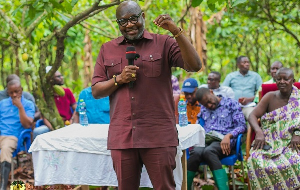Change:
A GNA Feature by Kwabia Owusu-Mensah
Kumasi, Sept 22, GNA - Building on access roads, waterways and unauthorised places had remained one of the major problems confronting city and town managers over the years.
The situation is more disturbing in major cities such as Accra, Kumasi, Takoradi, Tamale and other emerging peri-urban communities where private land developers have consistently ignored laid down drawings and plans and continue to build haphazardly, resulting in near slums in urban residential areas.
Whereas some people put the blame at the doorsteps of city authorities that grant building permits and supervise the construction and developments in these unauthorised areas, others blame the Town and Country Planning Department for what they refer to as their inefficient planning schemes for these areas resulting in the developers taking undue advantage to build on any available land.
It has also been said that lack of capacity on the part of the Town and Country Planning Department to enforce laws and regulations on area and site planning schemes, as well as the inability of city authorities to control physical developments in their areas have compounded the problem.
Traditional authorities and landowners have also been blamed for intentionally allocating waterways and reserved areas to private developers for their own selfish interest.
However, one could equally put the blame on the current town and country planning regulations and systems in the country, which is centrally controlled and does not give opportunity to the stakeholders in the communities to participate in the development of planning schemes in their areas.
Traditional rulers, landlords, developers and other opinion leaders, who have vital information, which are needed for proper planning, are denied the opportunity to make meaningful contributions before area and site planning schemes are prepared for the community. As a result, most of the stakeholders, especially chiefs and landowners see these plans as "foreign" and thereby disregard them and go ahead to either design their own plans or begin to demarcate lands any how.
Others who even decide to use the planning schemes designed by the town and country planning to allocate plots to developers, often do not understand the interpretations in the plans and the reasons why certain areas should not be allocated.
Thus, the current planning approach has alienated the very people, who owned the land and, therefore, denied them the proper management and control of the land, resulting in the confused state cities and towns find themselves.
It is, therefore, heart warming that under the "agenda for change", the Town and Country Planning Department has decided to change its focus to reflect the current democratic dispensation which is blowing across all facets of human endeavour.
The Department has started engaging in discussions with relevant bodies to change some of its laws and regulations to enable it to involve all stakeholders in land to participate in planning schemes in all communities in the country.
Under the new system, chiefs, landowners, developers, identifiable groups and all other opinion leaders would be engaged in all town planning processes and a committee comprising the stakeholders and other technical experts constituted to ensure the implementation of approved schemes.
This will enable the people to own the schemes and protect them in order to prevent others from encroaching on unauthorised areas. Although the idea had eluded the town and city planners for quite sometime, it is considered as a welcoming change.
A pilot project code-named: "Participatory Urban Planning (PUP) is currently being implemented at Ejura-Sekyedumase and the Kintampo Districts.
The German Technical Co-operation (GTZ) is supporting the project, which is aimed at insulating the areas against improper and haphazard development, which had bedevilled Accra and Kumasi.
A statutory urban planning committee comprising all the stakeholders and technical experts from the Town and Country Planning Department has been formed to oversee the implementation of schemes approved by members of the communities during various workshops and seminars.
It is hoped that the Ejura and Kintampo townships would soon see orderly and well-planned physical development.
A proposal of massive public education campaign embodied in the "agenda for change" by the department is also welcomed news. Intensive public education on planning schemes, process and procedures, negative consequences of non-compliances with planning schemes and land use, as well as human settlements planning issues in the various local dialects, were very crucial to enable the public to become aware of their rights and responsibilities with regard to land and physical development in communities.
It is hoped that the Department would intensify its efforts to change some of its laws and regulations to enable the communities that are the beneficiaries of their services to participate in the processes and procedures regarding planning in their areas.
Opinions of Tuesday, 23 September 2003
Columnist: GNA














